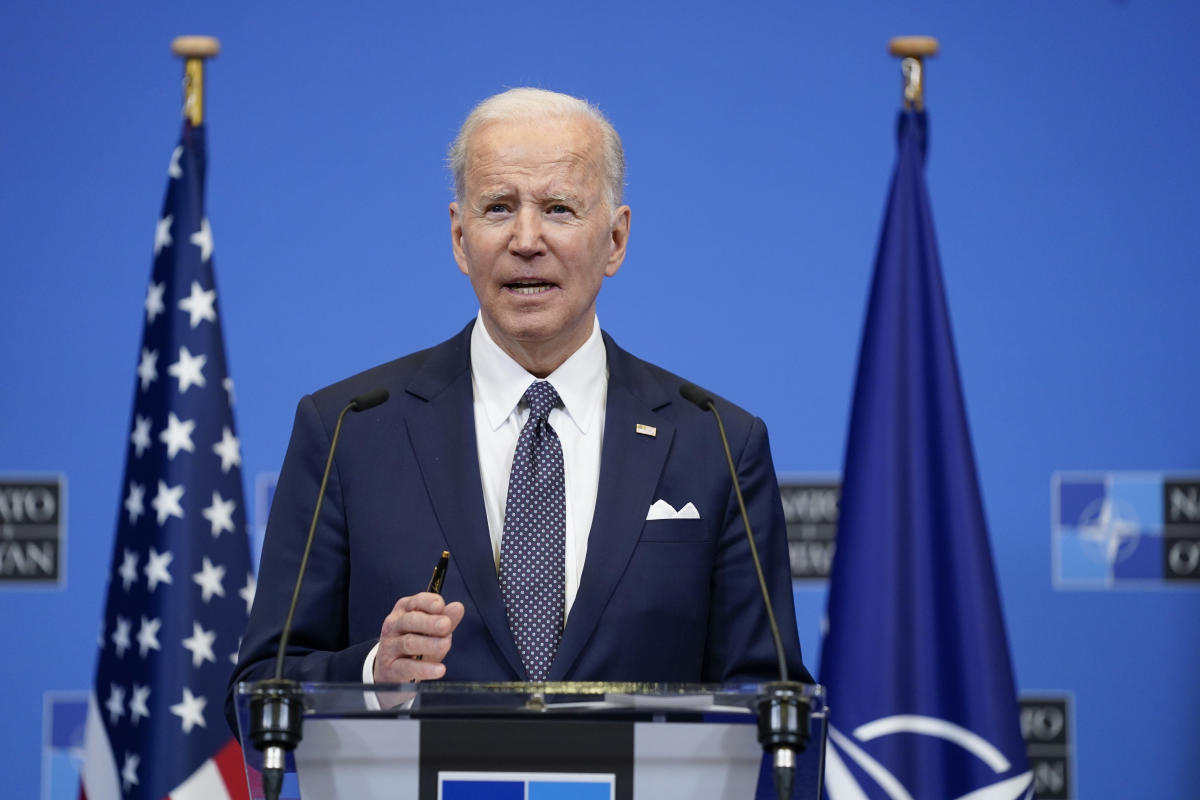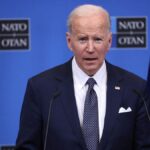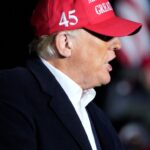
BRUSSELS — President Joe Biden on Thursday called for expelling Russia from the G-20 group of the world’s largest economies, suggested Ukraine join the meetings if that cannot happen and pledged to respond in kind if Vladimir Putin uses chemical weapons in the assault on his neighbor.
Speaking with reporters at NATO headquarters in Brussels during an extraordinary day of meetings, Biden said the question of booting Russia from the G-20 was entertained, but he was deferential to the country now chairing the organization, Indonesia.
His comments were part of a harder-line stance on Putin, who reportedly plans to attend the G-20 summit this October. While Biden declined to share U.S. intelligence on the possibility that Putin might deploy chemical weapons in his nation’s war on Ukraine, he threatened to “respond if he uses it” and promised that such an attack would “trigger a response in kind” from NATO forces.
Biden’s trip was largely an effort to lean on his familiarity with world leaders and long career in foreign affairs to hold the West together with a unified ratcheting up of pressure on Moscow and economic and military help for Ukraine. On Thursday, his administration joined other governments in rolling out next steps to impose wider sanctions on Russia and bolster humanitarian aid and refugee assistance.
For Biden, the clock is ticking, with growing doubts at home that he is up for the moment. A new Associated Press poll found that about a quarter of respondents said they are very confident he can handle the current crisis, and a majority think he lacks toughness in countering Russia.
While the trip to Brussels represented a chance to tout the diplomatic gains made, it also revealed the limitations to the West’s response to Putin.
Biden was bullish about the NATO alliance but has resisted Ukraine’s calls for it to enforce a no-fly zone in the country. He called for Russia’s ouster from the G-20 but conceded it likely won’t happen. He unveiled new sanctions but acknowledged that they aren’t and haven’t been a deterrent. And while his administration wants to get Europe to stop relying on Russian energy, they recognize it can’t be done immediately or fully.
With the possibility of the conflict escalating further, Biden has relied on a small group of senior national security officials who have been holding classified meetings three times a week to determine how the U.S. and its allies should respond if Putin unleashes chemical, biological or nuclear weapons.
The group, known as the Tiger Team, has also begun exploring how to respond if Putin expands the war into NATO countries or seeks to attack neighboring nations like Georgia and Moldova, according to two administration officials not authorized to speak publicly about the secretive organization.
The group has recommended to Biden that he shift tactics and not explicitly outline what he would or would not be willing to do if Putin were to reach into his arsenal for a more lethal weapon, according to the officials. That differs from Biden’s approach to most of the conflict, when he has very clearly drawn boundaries to what his response to Putin would be.
Biden did not come to Brussels empty handed. He announced that the United States would welcome up to 100,000 Ukrainian refugees and stood with allies in leveling further sanctions against Russia while sending more supplies and funding to Ukraine.
Weaponry has become a pressing Ukrainian request, according to two administration officials. Ukrainian defense officials have begun signaling to their allies that their army could run out of certain munitions, including anti-aircraft missiles, in the next few weeks. U.S. officials are working with NATO allies to expedite delivery of such weapons, the officials said.
The leaders are facing heightened calls to assist Ukraine from its president, who appeared by video at both the NATO and G7 meetings with the half-dozen other advanced nations. Volodymyr Zelenskyy criticized the allies for their refusal to provide fighter jets — so far a non-starter given the likelihood Russia would see it as an escalation that could lead to direct conflict with Western powers.
“NATO has yet to show what the alliance can do to save people,” Zelenskyy told his counterparts. “To show that this is truly the most powerful defense union in the world. And the world is waiting. And Ukraine is very much waiting. Waiting for real actions. Real security guarantees.”
As Biden went from the NATO meeting to gather with the G-7, Secretary-General Jens Stoltenberg confirmed to reporters that NATO agreed to activate chemical, biological and nuclear defense systems, a move he said would enable it to move forces more quickly to where they are needed. He also issued a warning on behalf of the group to China that it should not attempt to rescue Russia from the crippling sanctions, echoing remarks from earlier in the day by a senior Biden administration official.
“They should join the rest of the world and clearly condemn the brutal war against Ukraine and not support Russia” — both economically and militarily, Stoltenberg said after the meeting with Biden.
Stoltenberg, whose term on Thursday was extended through September of next year, added that “any use of chemical weapons would fundamentally change the nature of the conflict.” But he would not say how the alliance would react if such an attack were to happen.
Kremlin spokesperson Dmitry Peskov said in an interview earlier this week that Russia could consider using its nuclear weapons if it felt there was “an existential threat for our country.”
In many ways, Biden’s presidency had been building to this moment.
An ocean away from the domestic politics of home, he recalled to a reporter in Brussels his jump into the 2020 presidential campaign after watching the response from his predecessor, Donald Trump, to the clash between white supremacists and anti-racist protesters in Charlottesville, Va. A central argument of his campaign was that his presidenct would break from Trump and restore America as a faithful partner to its international allies.
Biden’s first trip to NATO as commander-in-chief last summer included pledges to strengthen ties so democracies could compete with the world’s rising autocracies. His repair work was tested over the last month — and, so far, the alliance has largely held while presenting unified opposition to Putin.
But possible fissures, namely around Europe’s reliance on Russian energy, loomed on the horizon. And so did the possible return of Trump. When asked at the news conference how American foreign policy could change if the Republican former president was elected again in 2024, Biden touted his engagement with allies and said he would be “fortunate” if a possible re-election bid was a rematch with his predecessor.




